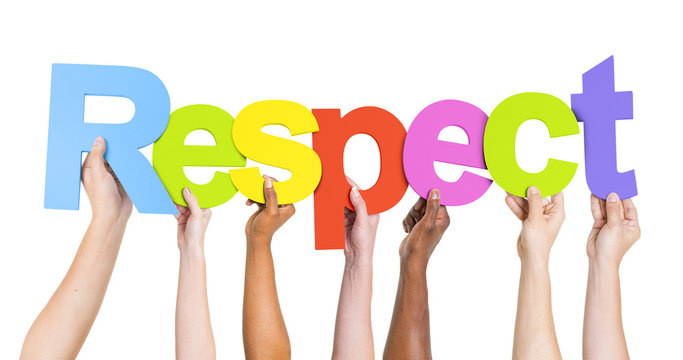While the question of whether respect is earned or expected has been one that is highly debated, the verdict is often fluid. Some believe it is an earned attribute built off of characteristics such as hard work, accomplishments, integrity, and kindness. Others believe its presence is necessary in order for people to co-exist, especially in a digital age where respect is often traded for sensationalism. This dual perspective piece explores both ideas.
Is Respect Earned or Expected?
Grace Carter
Respect can be seen as either a personality trait or an action. The way people are viewed versus the way they act. The bigger picture, however, is not necessarily what respect is, but how people reach a point of respect and if there’s more than one way to get there. This poses the ultimate question: is respect earned or expected?
Respect can be viewed in more than one way, but even with all the different perspectives and possible answers, I believe respect is an earned quality. Whether or not it’s the deep admiration you feel for someone due to their accomplishments or kindness, or how important someone’s feelings and opinions are to you, they had to earn your admiration and the respect you feel for them. Even if you expect someone to be respectful towards you, you had to have done something that caused them to feel that way, making even expected respect earned from past actions.
According to the dictionary, to earn something means to deserve it, and that directly means “to do something or show qualities worthy of reward.” People earn, or deserve, the respect you show them and just as easily as they earned that respect, they can lose it. It is not a hard feat. Sometimes it can be easy to find yourself in a bad situation that leads to a loss of trust, making it difficult to admire someone’s positive actions. While respect and admiration can be earned through hard work and kindness, it can also be broken through a person’s undermining of that hard work and kindness.
Respect does not necessarily have to be looked at like a bucket that fills and empties on a case-by-case basis, and in reality, it is not as simple as that. Respect can be seen as a deeply abstract concept that has many definitions that are different to each person. At the end of the day, respect is an earned quality, and it is so important to keep relationships that hold mutual respect that is deserved by all.
Respect in the Digital Age: An Earned Virtue or an Entitlement?
Seleena Busi
“Respect was intended to cover the empty place where love should be.” – Leo Tolstoy
The digital age has ushered in a realm where the boundaries of respect are not as clearly defined as they once were. Online platforms, social media, and instant communication have blurred the lines between public and private, making it sometimes difficult to distinguish respectful behavior from its opposite. The ease of anonymity in the digital world has, in some cases, led to a decline in civility and a rise in online harassment and cyberbullying.
In this digital landscape, the question of whether respect is earned or expected has taken on a new complexity. The online environment often rewards attention-grabbing antics and sensationalism, sometimes at the expense of traditional values of decency and respect. It can be argued that the very act of expecting respect online, without first demonstrating it through one’s behavior, has become a contentious issue.
The Impact on The Next Generation
The digital age has had a significant impact on the next generation’s understanding of respect. Young people are growing up in a world where online interactions are an essential part of their social lives. As a result, they are learning to navigate a complex digital landscape where respect and disrespect coexist.
The internet provides a platform for the next generation to witness a range of behaviors. On one hand, it offers a wealth of information that promotes open-mindedness, diversity, and understanding. It connects people from different parts of the world, encouraging cross-cultural respect. For example, social media campaigns have raised awareness about different social issues, leading to positive change. The internet has democratized access to education and information, allowing young people to learn about different cultures, perspectives, and histories.
However, it is also important to acknowledge the negative aspects of the digital world. Disrespectful behavior, online harassment, and hate speech have found a breeding ground on the internet. Cyberbullying, for example, can have devastating consequences on young lives. Trolling and the spread of false information can erode trust and contribute to a toxic online culture.
The next generation faces the challenge of distinguishing between respectful and disrespectful behavior in the digital sphere. They must learn to critically evaluate the information they encounter and differentiate between constructive debate and harmful discourse. This generation has the power to shape the online culture by actively promoting respectful dialogue and empathy in their digital interactions. For instance, movements like #MeToo gained momentum on social media platforms, highlighting issues of respect and consent. Young activists have harnessed the internet’s reach to advocate for positive change. They have used platforms like TikTok and Instagram to raise awareness about mental health and body positivity, fostering respect for diverse experiences and identities.
The internet has a profound impact on the next generation’s perception of respect. It offers both positive and negative examples, challenging young people to navigate a digital world where respect and disrespect coexist. The choices they make in their online interactions will not only define their own digital experiences but also influence the evolving norms of respect in the digital age.
Works Cited
Cambridge Dictionary. “Deserve.” @CambridgeWords, 27 Sept. 2023, dictionary.cambridge.org/us/dictionary/english/deserve#google_vignette.
“Childhood in the Digital Age | Educating 21st Century Children : Emotional Well-Being in the Digital Age | OECD ILibrary.” Www.oecd-Ilibrary.org, www.oecd-ilibrary.org//sites/2d4352c2-en/index.html?itemId=/content/component/2d4352c2-en#.
Powell, Catherine. “The Promise of Digital Activism—and Its Dangers.” Council on Foreign Relations, 21 Mar. 2022, www.google.com/url?q=www.cfr.org/blog/promise-digital-activism-and-its-dangers-0&sa=D&source=docs&ust=1696202074102517&usg=AOvVaw0asHJqtJzDNEf7H_KAzyqm.
Unicef. Children in a Digital World. 2017.
https://blog.cognifit.com/respect/






